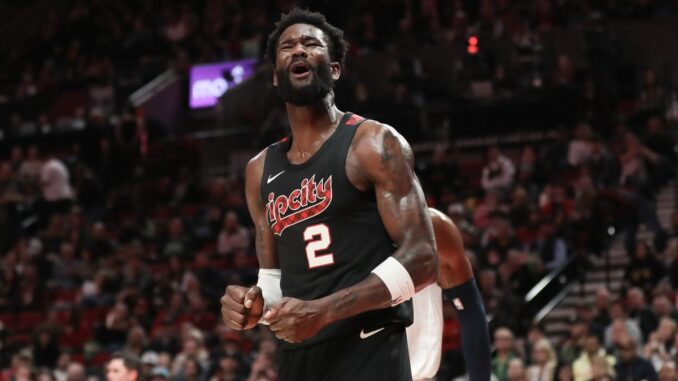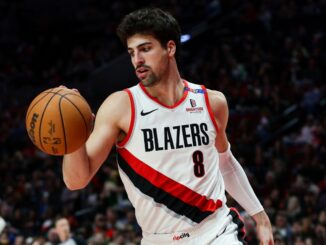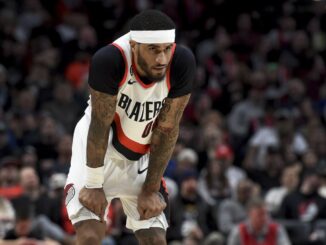
Deandre Ayton is used to being at the top. From his days as a consensus five-star recruit out of high school to being one of three true freshmen named to the All-American First Team in college to being a clear top pick in the 2018 NBA draft, Ayton has rarely been the underdog. However, since that infamous 2018 draft where the phenom known as Luka Doncic was picked only two spots behind Ayton, the mercurial center has been put under a microscope even other #1 picks have not experienced. As Luka took the league by storm their first season and has continued to establish himself as both the best player from that draft and a top-five player in the world, Ayton has seen a more up-and-down journey solidifying his role in the league. With Phoenix, he was inarguably an essential piece to their 2021 title run, looking like a force on both ends of the floor and a valuable long-term piece alongside their superstar Devin Booker.
However, in the time after that finals appearance, his status as an up-and-coming star, and public perception in general, has taken a series of hits. When his rookie contract expired after the 2021-22 season, Ayton signed a massive four-year $133 million extension with the Suns, a sizable investment by the team and a sign that they at least partially believed in his long-term future with the team. Underlying tensions between Ayton and Suns’ head coach Monty Williams came to the surface around this time, and even though they publicly put these issues to rest and co-existed for the following season, the damage was already done. In his fifth year, one where production should continue to climb, Ayton regressed in every avenue other than a few raw numbers. His efficiency dipped, as did his defensive effort, and an increasingly apparent lack of effort made him an unpopular figure amongst fans and media alike. After the 2022-23 season concluded, Williams was fired as head coach, and the Suns engaged in open trade talks for Ayton. It felt like an era ending too soon, but it was also clear the franchise needed to move on to maximize Booker’s peak, and Williams and Ayton were the biggest dominos to fall.
As the dust cleared, the Blazers emerged as an obvious trade partner as they worked to move both Damian Lillard and Jusuf Nurkic, as well as the hefty contracts both players came attached with. For supporters and critics of Ayton alike, it seemed like a relatively low-pressure and logical spot for him to land. A young, rebuilding team that would give him ample space to grow without the pressure to fit into the demanding ecosystem of a contender. At the very least, he’d have a more significant part in the offense and the freedom to chuck up a lot more shots and try more things than he would have been able to in Phoenix. Especially given that Portland’s young core is exclusively made of guards at the moment, pairing one or more of them with an elite young big would be an ideal fit. It was always going to be an adjustment, of course; as unhappy in Phoenix as Ayton was, he had also become accustomed to consistently winning and being able to compete in the playoffs every year. As this season has shown, wins are much harder to come by for this current iteration of the Blazers, and Ayton has taken longer than some expected to warm up. But warm up, he has.
The immediate results of Deandre in Portland were mixed, to say the least. Obviously, the team had been losing at a rate unseen since before the Lillard era, but as mentioned above, that wasn’t expected to impact Ayton’s raw numbers. Instead of showing he could inflate his production with a bigger role, his scoring actually took a dip, and in general, he didn’t seem interested in taking that next leap up. From the eye test, he didn’t look quite as unmotivated as back in Phoenix, but it was a far cry from the amount of effort he had promised before the season. He was slow to get back on defense, unwilling to demand the ball on offense, and seemingly happy to fit in and take whatever opportunities came his way. It was a disappointing start from all angles, and at the halfway point of the season, perceptions of what he could accomplish in this second phase of his career were trending increasingly negative. However, recent injuries up and down the Blazers roster have thrust Ayton into a more central role whether he likes it or not, and post-All-Star Break, it has looked like Ayton himself has found a new motivating force.
Since returning from the break, per Statmuse, Ayton has averaged 24.6 points, 14.3 rebounds, and 1.4 assists in 9 games. Both those point and rebound averages would be clear career highs, and even though it is a small sample size and should be taken with a grain of salt, it’s a clear sign to be optimistic about what he could produce in the future. In these recent games, his aggressiveness has been turned up a notch, taking exponentially more shots per game and looking happy to be force-fed the ball when other options aren’t available. It’s a far cry from even a couple of months ago when he would softly come off a screen and look utterly disinterested in being further involved in the play. His play style is still an acquired taste, much more reliant on mid-range jumpers and runners than the physical post-play one might expect from a traditional center. That being said, how he appears committed to crashing the boards, being the #1 or #2 option on offense, and doing that consistently should be highly encouraging for Portland fans and front office alike.
Ayton still has a relatively long road before it’s safe to call him a star or even a productive starter on a playoff team again. But the tear he’s been on recently seems sustainable, given his massive talent, and if he can invest in this style of play, Portland’s competitive timeline could absolutely be moved up. In a city where fans want to embrace pretty much every player that comes through the Moda Center’s doors, Ayton seems to be learning that showing effort and passion are the way forward.



